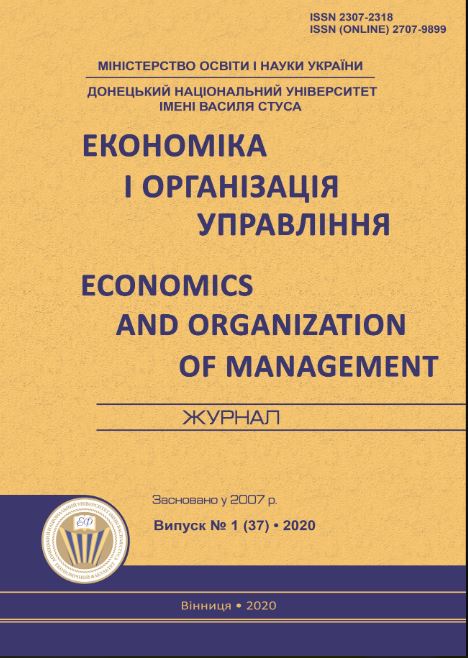Financial and management statements of domestic enterprises.
DOI:
https://doi.org/10.31558/2307-2318.2020.1.5Keywords:
financial reporting, management reporting, report of management, principles, regulation, users, markersAbstract
Identifying the relationship between financial and management reporting information, the place of each of them in the management decision making process by external and internal users, is an important methodological accounting task and, at the same time, a practical management task. This task has become especially relevant at the time of the implementation the report of management. The work of many scientists is devoted to the study of the theoretical principles of the management reporting of domestic business entities. Researchers considered the place of management reporting in the internal control system, its concept, architecture, classification, principles and process of formation. At the same time, the issues of integration of financial and management reporting data, the place within the accounting cycle of the entity, remain open to consideration. The purpose of the article is to identify markers of financial and management reporting of domestic entities in order to optimize the management decisionmaking process based on it. The results of the critical analysis the definition of «management reporting» in the scientific discussion revealed the perspectives of the study of this concept, the author's interpretation and the characteristic defining features of the types of reporting, which can be supplemented and detailed based on the tasks of management. These features (markers) were used to characterize the financial and management reporting of domestic entities. The use of these markers is able to improve the quality of the process of development and use of management reporting by eliminating functions that are not inherent in this reporting. The paper also summarizes the recommendations of the Ministry of Finance of Ukraine on the structure and content of the management report, its characteristics regarding the types of reporting. According to the results of the study, conclusions were drawn, directions of further searches were determined.References
Шепель Т. П. Роль і місце управлінської звітності в підвищенні ефективності функціонування підприємств. Інвестиції: практика та досвід. 2018. № 16. С. 31-34.
Воронко Р. Управлінська звітність в системі внутрішнього контролю. Інститут бухгалтерського обліку, контроль та аналіз в умовах глобалізації: міжнар. зб. наук. пр. 2016. Вип. 3. С. 85-96.
Кузнецова С. А. Інтегрована управлінська звітність: глобальні виклики та локальні рішення в епоху ноосфери. Економічний нобелівський вісник. 2014. № 1. С. 270-279.
Нагірська К. Є. Наукова концепція управлінської звітності: системний підхід до побудови та розвитку. Збірник наукових праць ВНАУ. Серія: Економічні науки. 2012. №1 (56). С. 78-86.
Ходзицька В. В. Архітектоніка управлінської звітності виробничих підприємств: методичні підходи. Фінанси, облік і аудит. 2016. Випуск 1 (29). С. 251-262.
Карпенко О. В., Любимов М. О. Класифікація управлінської звітності як основа розуміння її сутності. URL: https://eprints.oa.edu.ua/7021/1/22.pdf.
Гладій І. О. Управлінська звітність підприємства: принципи формування. Глобальні та національні проблеми економіки. 2018. № 23. URL: http://global-national.in.ua/issue-23-2018/31-vipusk-23-cherven-2018/4169-gladij-i-o-upravlinska-zvitnist-pidpriemstva-printsipi-formuvannya.
Король С. Я. Управлінська звітність: сутність і алгоритм формування. БІЗНЕСІНФОРМ. 2014. № 7. С. 325-331.
Лищенко О. Г., Козік А. Ю. Алгоритм підготовки управлінської звітності. Держава та регіони. Серія: Економіка та підприємництво. 2015. № 6 (87). С. 48-51.
Матюха М. М. Організаційні підходи формування управлінської звітності. Економічні науки. Cер. : Облік і фінанси. 2012. Вип. 9(2). С. 354-362
Скрипник М. І., Григоревська О. О. Бухгалтерська управлінська звітність: критичний аналіз порядку складання й особливостей практичного застосування. Інтелект ХХІ. 2016. № 5. С. 11-115.
Ясінська А. І., Демків Н. І. Методика формування управлінської звітності підприємства. Вісник Національного університету «Львівська політехніка». Серія: «Менеджмент та підприємництво в Україні: етапи становлення і проблеми розвитку». 2017. № 862. С. 305-312.
Про бухгалтерський облік та фінансову звітність в Україні: Закон України від 16.07.1999 р. № 996-XIV за станом на 22.01.2020 р. URL: https://zakon.rada.gov.ua/laws/show/996-14#n2.
Національне положення (стандарт) бухгалтерського обліку 1 «Загальні вимоги до фінансової звітності»: Наказ Міністерства фінансів України від 07.02.2013 р. № 73 за станом на 22.01.2020 р. URL: https://zakon.rada.gov.ua/laws/show/z0336-13.
Осадча Г., Синявська Ю. Управлінська бухгалтерська звітність та критерії оцінки її ефективності. Науково-виробничий журнал «Бізнес-навігатор». 2018. Випуск 6 (49). С. 223-227.
Позов А. Х. Характеристики фінансової та управлінської звітності. Ефективна економіка. 2012. № 9. URL: http://www.economy.nayka.com.ua/?op=1&z=1523.
Пінчук Т. А., Шрам Т. В., Ісакова В.Є. Теоретичні аспекти складання управлінської звітності. Економіка і суспільство. 2016. Випуск 4. С. 347-351.
Про затвердження Порядку подання фінансової звітності: постанова Кабінету міністрів України від 28.02.2000 р. № 419 за станом на 22.01.2020 р. URL: https://zakon.rada.gov.ua/laws/show/419-2000-п.
Методичні рекомендації зі складання звіту про управління: наказ Міністерства фінансів України від 07.12.2018 р. № 982 за станом на 22.01.2020 р. URL: https://zakon.rada.gov.ua/rada/show/v0982201-18.

